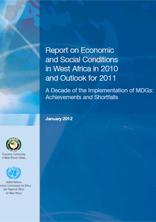Report on Economic and Social Conditions in West Africa in 2010 and Outlook for 2011

Sub-Saharan Africa (SSA) economies remain vulnerable and the sustainability of relatively strong growth rates is uncertain given the intensifying fiscal woes in the United States of America, Europe and Japan. During the 2007 and 2008 economic crises, the SSA countries were able to use their heightened economy activity led by booming primary sector (minerals and oil), and improved political and economic governance to consolidate their fiscal positions by reducing deficits and debts to sustainable levels. The countries introduced economic reforms and new progressive economic policies, and ushered in an economic environment that received the positive support of development partners who responded on selective basis by increasing aid flows and introducing debt relief. These measures further spurred economy activity. However, the food and energy price shocks which preceded the global financial crisis weakened the external position of net importers of these commodities, fuelled inflation, and hampered the economies’ growth potential. They also made more difficult the dual task of further consolidating macroeconomic gains, on the one hand, and increasing social spending to fight poverty, on the other.